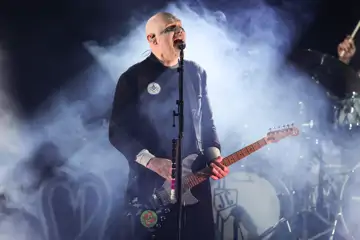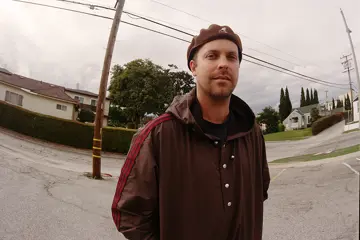WARNING: Get Back! There might be some spoilers ahead.
YESTERDAY
★★1/2
Yesterday has one of those conceptual comic set-ups: what if, in an instant, no one in the world had heard of The Beatles? It’s a Freaky Friday moment that should, really, be treated as a fascinating philosophical question: what does old fashioned rock’n’roll mean in the year 2019? Would the world still care about jams as determinedly old-timey as Help or I Wanna Hold Your Hand or Back In The USSR? Would these songs, if released today, still being as widely beloved? Or would they seem retro, niche, ‘indie’; get refused radio play by modern day commercial formats? I Saw Her Standing There rollicks along, sure, but where’s the drop?
A study of changing cultural tastes and the persistence of ear worms might be an interesting film. Instead of an interesting film, though, we have Yesterday, a movie written by Richard Curtis (and directed, weirdly, by Danny Boyle, who shelves his visual tics for a bland, televisual treatment of the pat material). Which means: forget the deep thoughts or societal studies, here’s some sitcom hijinks, rom-com tropes, and shameless feelgoodery.
The Beatles — and, somehow, Coke, Harry Potter, and cigarettes — vanish in an opening-act flash-of-magic, the kind familiar from rom-coms eternal. Here, it happens when the world loses power for 12 seconds in a mysterious blackout; the idea that history can be erased via electrical outage incredibly symbolic in the digital-data-storage era, but never addressed as such (in this alternate history, Oasis was erased, too, but Neutral Milk Hotel still exists, suggesting a film that’ll make a joke of obvious Beatles influence, but not explore the thought too thoroughly).
Don't miss a beat with our FREE daily newsletter
Struck by a bus at the same moment, just to add to the tropes, is a struggling singer-songwriter played by EastEnders graduate Himesh Patel. He’s an instant omega man: the only man left alive... who knows of The Beatles. When he plays their songs, people assume he’s written them, and, thus, soon the great rom-com lie is in; stick around for the final act revelation. The person he must confess it all too is his one true love, Lily James, girl-next-door and lifelong friend and manager and person who he’ll ultimately end up with via a grand romantic gesture at the climax.
Passing these songs off as his own, he becomes some kind of viral sensation; aided by Ed Sheeran, who is in this film, playing himself, an awful lot. Eventually Patel sells out to power manager Kate McKinnon, who plays a comic personification of the music biz’s pact with the devil, literally telling him aloud that she’s offering “the poisoned chalice of money and fame”. The moral of the story is about the dangers of forgetting where you came from, which of course means that money and fame are nothing compared to marrying the person you’ve known since you were a kid.
Oh, I guess it’s also about passing off the songs of other people as your own, but Curtis eventually has to settle on the idea that a world with Beatles songs is better than a world without them. Without Ob-La-Di Ob-La-Da, what would kids be forced to sing at school assemblies?
There’s also a weird retconned appearance by a fictional 70-something John Lennon (played, it seemed to me, by an uncredited, digitally-aged Jamie Bell), whose life is rewritten in such a way — maybe he’d have had a happy life if he was never bigger than Jesus? — that, like the premise itself, offers far more questions than answers. His appearance is simply to offer some kind of moral alternate-timeline blessing to this whole endeavour; making it feel like the filmmakers letting themselves off the hook for this exercise in cinematic karaoke.
And, ultimately, that’s all it is. Yesterday is, fantastical premise or no, just an excuse to get a host of Beatles songs on-screen, with the rights for the music likely costing more than the entire rest of the production budget. With the armful of toe-tappin’ tunes at the centre of an often-rickety narrative, Yesterday is akin to something like Mamma Mia!, where the shittiness of the movie is ultimately unconcerning for an undiscerning crowd, who just wants to hear the hits, then hit the exits with a spring in their step. Those who come expecting something smartly-done will, instead, trudge out of the cinema, defeated oncemore by the man who made history’s worst-ever movie, Love, Actually.
UNDER THE SILVER LAKE
★★★1/2
As a goofy stoner-paranoia riff on noir movie tropes set in a toxic Los Angeles, populated by colourful characters, and delivered with genuine directorial command, there’s two obvious precedents for David Robert Mitchell’s Under The Silver Lake: the Coen Bros’ The Big Lebowski and Paul Thomas Anderson’s Inherent Vice. Like those films — made as follow-ups to Fargo and The Master, respectively — it’s a kooky, oddball, unexpected left-turn following a beloved masterwork. And, like those films, it’s best thought of as shaggy, unkempt, wild, ridiculous; a movie that may be maligned upon release, but will surely find its intended audience — goofy, paranoid stoners — over time.
This is both grand praise and gentle critique. Under The Silver Lake is genuinely ambitious, a big swing by a director out to merge a surfeit of wild ideas and a confluence of oft-contradictory tones into a semi-coherent, hallucinatory whole. This stands in opposition to Mitchell’s prior pictures, which were astonishing works of sustained, singular mood, each set amongst teenagers in the Michigan suburbs where he grew up. The Myth Of The American Sleepover was a bittersweet teen-movie whose one-night-wandering played like a gentle, bashful riff on Dazed & Confused. It Follows was an instantly-iconic horror flick, whose slowly-creeping sense of dread served as parable for contemporary anxieties about intimacy.
Under The Silver Lake is way bigger, brasher, and messier; its narrative sprawl echoing its setting, which feels like a cine-realm resembling David Lynch’s forever-nocturnal, terrorstruck LA. Andrew Garfield stars as an aimless, 20-something stoner prone to voyeuristically peeping on his apartment-complex neighbour, Riley Keough. When this femme fatale suddenly disappears, ‘moving out’ in the middle of the night, he suspects foul play, or secret conspiracy. Thus, our existential detective is lured —and slowly sinks— into an underworld of surreal nightclubs, parties, tunnels, and mazes, a journey coded by a host of cryptic clues hidden in cereal boxes, gamer magazines, and pop-songs. What ultimately results is an artwork that doesn’t quite hit its mark, a noble failure that still feels like a strange success.
PARASITE
★★★★1/2
In Bong Joon-ho’s Palme d’Or-winning social satire, there are two moments where a door opens unto a whole new world. In a film about economic inequality in South Korea, each eye-opening change carries with it a radical shift in class; Parasite less about how the other ‘half’ lives, more about the grand disparity between the wealthiest and poorest members of society.
Its title echoes the grift being carried out by its central, below-the-poverty-line family, a Song Kang-ho-led unit reminiscent of the oddball clan in Bong’s beloved monster-movie The Host (and, whilst we’re remembering Bong’s past: there’s echoes of both Barking Dogs Never Bite’s social-satirical black comedy and Snowpiercer’s grand symbols of social hierarchy, too). When their son (Choi Woo-shik) unexpectedly finds himself as an English tutor for a wealthy family, soon they’re enacting a plan to have all members of their own family employed as servants, via various comic and duplicitous means. It’s a grand scam without any real victims; until, ultimately, the chickens come home to roost.
If this sounds a little vague, that’s because Parasite is a film whose narrative surprises are best preserved. Even when working in something approximating genre —serial killer, monster movie, post apocalyptic parable — Bong is a director who never leads audiences down safe narratives, along well-trodden paths. Which goes back to those moments in which Parasite heads through those doorways: one which opens onto ascending stairs, that rise into a heavenly realm of wealth and privilege; the other which opens onto descending stairs, leading down into that eternal repository of the hidden and the repressed: the basement.
Being taken along for the ride, you know you’re in good hands, and Parasite is the work of a filmmaker at the peak of his powers. In true Bong form, Parasite is weird, wacky, incisive; full of not just black comedy and social satire, but wild ideas and incredible direction. It’s a genuine delight, one of the most deliriously fun cinematic experiences since his pal Park Chan-wook’s The Handmaiden.
NEVER LOOK AWAY
★★★
Few 21st century filmmakers have produced such disparate returns on their first two films as Florian Henckel von Donnersmarck. The German filmmaker’s debut picture, 2006’s The Lives Of Others, was a widely acclaimed and wildly loved masterwork, a Stasi-themed drama that’s at once art movie, intimacy thriller, and instantly iconic study of life/love under a surveillance state. After being hailed, he was soon reviled: his second film found him shamelessly cashing a directorial cheque, helming Hollywood’s dreadful, dead-eyed, Johnny Depp and Angelina Jolie-starring Anthony Zimmer remake, 2010’s The Tourist. Watching Never Look Away, viewers will be able to pretend that The Tourist never happened. This is the follow-up you’d expect from the director of The Lives Of Others: another handsomely directed historical epic studying the German state through intimate, human drama.
It’s a quasi-biopic of artist Gerhard Richter; a fictionalised account of a life that often echoes his, especially in terms of the artistic output. Here, Kurt Barnert (Tom Schilling), is a budding artist, born in the 1920s; just old enough to be coming-of-age, in Dresden, against the rise of Nazism. In certain ways, it’s about art and its relationship to fascism: the film opens with an exhibition of ‘degenerate art’, derided in the realm of national socialism. Post war, when our protagonist is at art school in the newly-divided East, he’s taught to disdain the personal; that all art should be socialist realism, an expression of the workers, the people, the state. Open relocation to the West, and landing at the Düsseldorf art academy, he’s thrown into the fires of modernism and post-modernism, a figurative painter out of step with rock’n’roll-loving, turtleneck-wearing performance artists and situationists. After years being conscripted to paint for the state, he now must find his own style, his own voice, and, most of all, something to say.
Running parallel to this is a grand melodrama, something that makes you understand where the Oscar nominations for Never Look Away came from. Donnersmarck is essentially out to reduce history to personal drama, using this quasi-biopic as an exploration of horrifying German history. As happened in Richter’s life, a beloved aunt (Saskia Rosendahl), diagnosed as schizophrenic, is euthanised by the state as part of a Eugenics-inspired ‘cleansing’ of bad blood; part of Nazism horrifying obsession with genetic purity. Here, this is brought oh so close to home by having the decreeing Dr. Death become our artist’s father-in-law; an ongoing antagonist made the personification of social evils.
These twin narratives sometimes seem in competition with each other; the burrowing down into the personal and the reaching for the grand-scale and social never feeling elegantly wed. Unlike The Lives Of Others, it’s not a work of sustained mood. Instead, it’s a film in which you feel the reaching; Donnersmarck clawing —across three hours— for something shamelessly grand.















